- Kenmore refrigerator water filters
- Whirlpool refrigerator water filters
- Samsung refrigerator water filters
- GE refrigerator water filters
- LG refrigerator water filters
- Frigidaire refrigerator water filters
- KitchenAid refrigerator water filters
- Maytag refrigerator water filters
- Kenmore Elite refrigerator water filters
- Estate refrigerator water filters
- GE Profile refrigerator water filters
- Amana refrigerator water filters
- Bosch refrigerator water filters
- Dacor refrigerator water filters
- Electrolux refrigerator water filters
How to replace a chainsaw carburetor
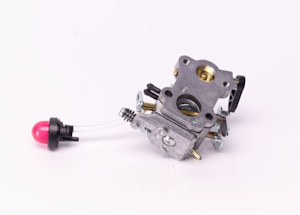
This DIY chainsaw repair guide explains how to replace a chainsaw carburetor. The carburetor mixes air and gas, which ignites in the cylinder to power the engine. If the engine won’t start when the tank is full of fresh fuel, test the carburetor by removing the air filter and pouring about a teaspoon of fuel into the carburetor. Pull the starter rope. If the engine starts and then quickly dies, the carburetor is likely the problem. Replace the carburetor using the manufacturer-approved chainsaw part.
Use these steps to replace the carburetor in Craftsman, Poulan, McCulloch, Snapper, Husqvarna, Troybilt and MTD chainsaws.
If you prefer rebuilding the carburetor, How to Rebuild a Chainsaw Carburetor shows how.
Quick links
Instructions
Tools required
Allen wrench
7/16-inch socket driver
Needle-nose pliers
Approved fuel container
Rags
Work gloves
Safety glasses
Repair difficulty
Time required
15 minutes or less
Repair difficulty
Time required
15 minutes or less
Instructions
- 01.
Drain the fuel tank
In a well-ventilated area, remove the fuel cap and the drain the tank into an approved storage container.
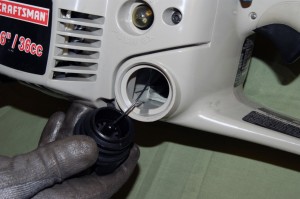
PHOTO: Open the fuel cap.
- 02.
Remove the cylinder shield
Using an Allen wrench, remove the screws that hold the cylinder shield to the engine. Lift off the cylinder shield.
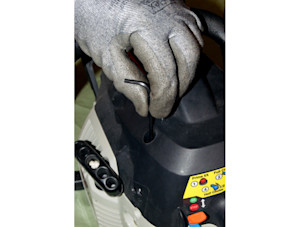
PHOTO: Remove the screws that hold the cylinder shield.
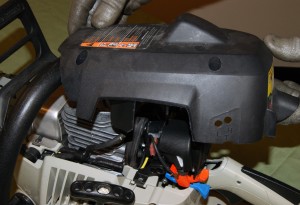
PHOTO: Remove the cylinder shield.
- 03.
Disconnect the spark plug wire and remove the air filter
Disconnect the wire from the spark plug. Pull the cover off the air filter housing and remove the filter.
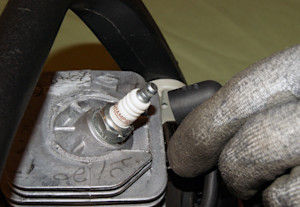
PHOTO: Disconnect the spark plug wire.
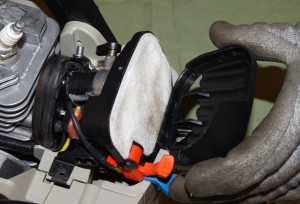
PHOTO: Remove the air filter cover.
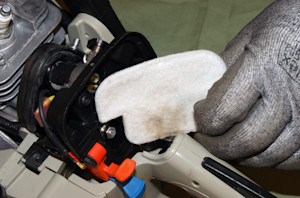
PHOTO: Remove the air filter.
- 04.
Remove the carburetor mounting nuts
Using a 7/16-inch socket, remove the two mounting nuts that secure the carburetor to the engine.
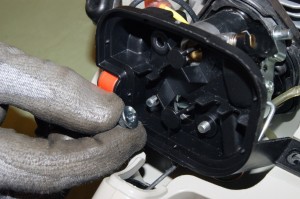
PHOTO: Remove the mounting nuts.
- 05.
Detach the air filter housing
Pull the air filter housing off the carburetor.
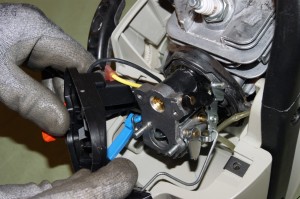
PHOTO: Remove the air filter housing.
- 06.
Disconnect the fuel lines
Pull the carburetor away from the engine block. Be careful not to bend the throttle linkage or damage the gas lines. Use needle-nose pliers to detach the gas lines from the carburetor.
Tip: For accurate reassembly, take digital photos of the throttle linkage on the carburetor and the gas line connections.
PHOTO: Carefully pull the carburetor forward on the mounting studs
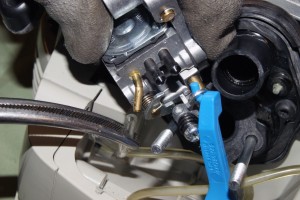
PHOTO: Pull the fuel lines off of the carburetor.
- 07.
Remove the carburetor
Disconnect the throttle linkage. Pull the carburetor completely off the mounting studs. Check the mounting gasket and replace it if necessary.
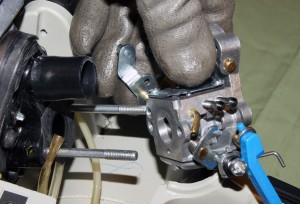
PHOTO: Pull the carburetor off the mounting studs.
- 08.
Install the new carburetor
Connect the throttle linkage on the new carburetor. Slide the new carburetor onto the mounting studs. Connect the fuel lines.
- 09.
Fasten the carburetor in place
Slip the carburetor onto the mounting studs and push it into place. Position the air filter housing on the protruding studs.
Replace the mounting nuts and tighten them to seal the gasket between the engine and the carburetor.
- 10.
Reinstall the air filter cover and connect the spark plug
Position the air filter on the housing and replace the cover. Reattach the spark plug wire.
- 11.
Reinstall the cylinder shield
Reinstall the cylinder shield on the chainsaw. Refill the fuel tank.
Warning: Undertaking repairs to appliances can be hazardous. Use the proper tools and safety equipment noted in the guide and follow all instructions. Do not proceed until you are confident that you understand all of the steps and are capable of completing the repair. Some repairs should only be performed by a qualified technician.
Symptoms for gas chainsaws
Choose a symptom to see related chainsaw repairs.
Main causes: cracked fuel lines, leaky carburetor seals, damaged fuel tank cap, cracked fuel tank…
Main causes: bad gas, engine needs tune up, cracked fuel lines, dirty carburetor…
Main causes: stale gasoline, cracked fuel lines, dirty carburetor, damaged spark plug, worn piston rings…
Repair guides for gas chainsaws
These step-by-step repair guides will help you safely fix what’s broken on your chainsaw.

How to rebuild a chainsaw carburetor
If your chainsaw isn't running well, a dirty carburetor could be the problem. You can take it apart, clean it and rebuil…
Repair difficulty
Time required
15 minutes or less

How to replace a chainsaw carburetor
If the engine won't start even though there's fuel in the chainsaw, the carburetor could be the problem. Sometimes, it's…
Repair difficulty
Time required
15 minutes or less

How to replace chainsaw fuel lines
The fuel line on a chainsaw becomes brittle over time and can crack. Replacing it doesn't require a lot of DYI experienc…
Repair difficulty
Time required
15 minutes or less
Effective articles & videos to help repair your chainsaws
Use the advice and tips in these articles and videos to get the most out of your chainsaw.

Learn about the most common replacement parts for chainsaws and how they can help you fix chainsaw problems.…
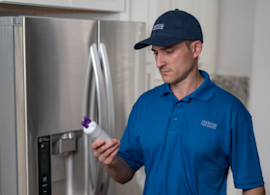
Get answers to frequently asked questions about Sears and Sears PartsDirect.…